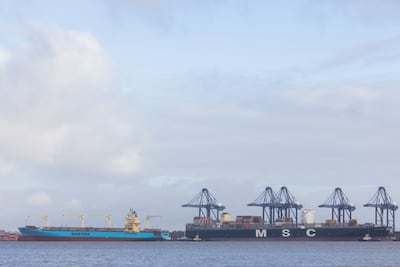Live updates: follow the latest news on Russia-Ukraine
Britain and the eurozone were braced for economic disruption on Monday after sanctions imposed on Russia by the West threatened to heighten the supply chain crisis and send inflation and energy prices soaring.
Oil prices and safe havens surged in early trading on Monday, while the rouble and European equities sank after world powers imposed more sanctions on Russia over its invasion of Ukraine, fanning fears about a possible global energy crisis that could stoke inflation.
Kwasi Kwarteng, Britain’s Secretary of State for Business, said on Monday that while the UK was not reliant on Russian gas, it was “vulnerable to high prices set by markets”.
The economic fallout from the war became evident at the weekend after energy company BP exited its share in Rosneft, a state-controlled Russian oil and gas company, in reaction to the invasion.
BP’s shares dropped the most in three months on Monday morning, falling 7.16 per cent at 9.48am London time, after the company’s decision to offload its stake in Rosneft was given little chance of attracting a buyer.
It has held a 19.75 per cent stake, currently valued at $14 billion, in Rosneft since 2013.
BP chief executive Bernard Looney and his predecessor Bob Dudley resigned from Rosneft’s board.
The London-based company has already said it could take a financial hit as high as $25 billion from leaving Russia.
“A write-down of this magnitude is also likely to limit the extent to which BP can continue to accelerate its transition towards renewables,” said Susannah Streeter, senior investment and markets analyst at Hargreaves Lansdown.
The crisis is focusing minds on the need to find alternative sources to reliance on Russian oil, with Mr Kwarteng stating: “Now, more than ever, we must focus on generating cheaper, cleaner power in Britain, for Britain, all while helping our European allies move away from their dependency on Russian oil and gas.”
While the UK obtains only 6 per cent of its crude oil and 5 per cent of its gas from Russia, the EU is more exposed, with almost half of its gas supply coming from the country.
Germany pledged on Sunday to build up renewable energy as fast as possible, and Chancellor Olaf Scholz unveiled plans on Sunday to build his country’s first gas terminals to break German dependence on Russian energy exports.
Two new liquefied natural gas terminals will be built in the states of Schleswig-Holstein, in the north, and lower Saxony, in the north-west. Germany will also build up reserves of coal and gas.
More sanctions were announced at the weekend, including a broader agreement on restricting access to the Swift international payment system for selected Russian banks.
“This would make it more difficult – though not impossible – for these institutions to make cross-border payments,” said Neil Shearing, group chief economist at Capital Economics.
“The list of institutions affected has yet to be released, but when it is worth watching whether Gazprombank is included, since it handles a large share of Russia’s energy exports this could have implications for energy flows,” Mr Shearing said.
The sanctions have already caused turmoil in Russia’s financial markets, with the economy expected to be hit hard. Russia’s central bank more than doubled its key policy rate on Monday and introduced some capital controls as it scrambled to shield the economy.
The main interest rate will rise to 20 per cent, the highest this century, from 9.5 per cent to counter the rouble’s rapid depreciation and higher inflation, which threaten Russians’ savings.
Mr Shearing said subsidiaries of some Russian banks abroad are likely to come under intense pressure – and may fail – but he said these are probably too small to create systemic risks.
“So far at least, the West has stopped short of a ban on energy imports from Russia, which would be the most powerful sanctions they could implement,” he said.
The action to freeze out Russia’s financial sector hit the rouble hard on Monday, causing it to plunge to a record low of less than 1 US cent.
Global markets are braced for a rocky day of trading with the oil benchmark Brent crude jumping above $102 a barrel and gas prices surging almost 40 per cent.
Britain and Europe expect further supply chain disruption at a time when dwell times at UK ports have already more than doubled since last spring.

Shippers spent, on average, more than a week discharging at UK ports last month, well above the European average of about five days.
But Russia’s invasion of Ukraine threatens to prolong the chaos.
Glenn Koepke of FourKites, a supply chain management platform, said ocean rates could double from current levels as rail routes from East to West are blocked.
Further signs that the conflict will affect global supply chains came after Volkswagen idled two car plants owing to an interruption in the supply of electric wires from Ukraine.
“Meanwhile, there have been reports that a pipeline near Kharkiv that transits gas to Europe has been hit in a missile attack,” Mr Shearing said.
“We continue to think that the overall impact on global supply chains will be relatively small, but the expulsion of some Russian banks from Swift means that non-energy trade between Russia and Europe is likely to slump.
“Attacks on infrastructure that carries gas to Western Europe may push up prices further and add to inflation pressure.”
Some analysts already expect Britain’s inflation rate, which rose to an annual rate of 5.5 per cent in January, to peak at 8.2 per cent in the spring as a result of the crisis.
In the eurozone, where consumer price inflation reached 5.1 per cent in January, higher oil, gas and some non-energy commodities will also cause inflation to rise. Wheat and corn prices are set to push up the cost of some food.

























































